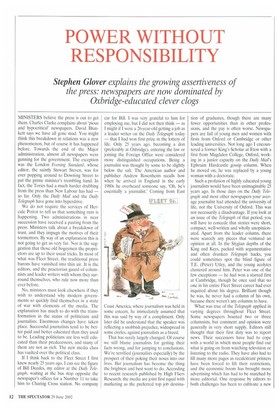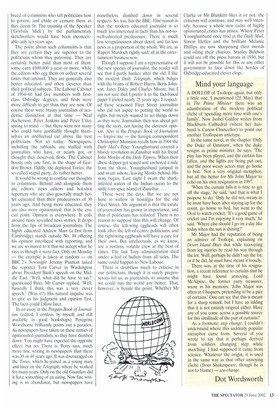POWER WITHOUT RESPONSIBILITY
Stephen Glover explains the growing assertiveness of
the press: newspapers are now dominated by Oxbridge-educated clever clogs
MINISTERS believe the press is out to get them, Charles Clarke complains about 'pious and hypocritical' newspapers. David Blunkett says we have all gone mad. You might think this breakdown in relations was a new phenomenon, but of course it has happened before. Towards the end of the Major administration, almost all newspapers were gunning for the government. The exception was the London Evening Standard, whose editor, the saintly Stewart Steven, was for ever popping around to Downing Street to pat the prime minister's trembling hand. In fact, the Tories had a much harder drubbing from the press than New Labour has had — so far. Only the Daily Mail and the Daily Telegraph have gone into hyperdrive.
We do not require the services of Hercule Poirot to tell us that something rum is happening. Two administrations in near succession have received a pasting from the press. Ministers talk about a breakdown of trust, and they impugn the motives of their tormentors. By way of an explanation this is not going to get us very far. Nor is the suggestion that those old bogeymen the proprietors are up to their usual tricks. In most of what was Fleet Street, the traditional press barons have vanished into thin air. It is the editors, and the praetorian guard of columnists and leader writers with whom they surround themselves, who rule now more than ever before.
No, ministers must look elsewhere if they wish to understand why modern governments so quickly find themselves in a state of war with elements of the media. The explanation has much to do with the transformation in the status of politicians and journalists. Enormous changes have taken place. Successful journalists tend to be better paid and better educated than they used to be. Leading politicians are less well educated than their predecessors, and many of them are not as rich. The new media class has vaulted over the political class.
If I think back to the Fleet Street I first knew nearly 25 years ago, I can see the figure of Bill Deedes, my editor at the Daily Telegraph, waiting at the bus stop opposite the newspaper's offices for a Number 11 to take him to Charing Cross station. No company car for Bill. I was very grateful to him for employing me, but I did not then think — as I might if I were a 26-year-old getting a job as a leader writer on the Daily Telegraph today — that I had won first prize in the lottery of life. Only 25 years ago, becoming a don (preferably at Oxbridge), entering the law or joining the Foreign Office were considered more distinguished occupations. Being a journalist was thought by some to be slightly below the salt. The American author and publisher Andrew Rosenheim recalls how when he arrived in England in the early 1980s he overheard someone say, 'Oh, he's essentially a journalist' Coming from East
Coast America, where journalism was held in some esteem, he immediately assumed that this was said by way of a compliment. Only later did he understand that the speaker was reflecting a snobbish prejudice, widespread in some circles, against journalists as a breed.
That has surely largely changed. Of course we still blame journalists for getting their facts wrong, and for jumping to conclusions. We're terrified (journalists especially) by the prospect of their poking their noses into our lives. But journalism has become the thing the brightest and best want to do. According to recent research published by High Fliers Research, the media are joint first equal with marketing as the preferred top job destina
tion of graduates, though there are many fewer opportunities than in other professions, and the pay is often worse. Newspapers are full of young men and women with firsts from Oxford or Cambridge or other leading universities. Not long ago I encountered a former King's Scholar at Eton with a first from Magdalen College, Oxford, working in a junior capacity on the Daily Mail's Ephraim Hardcastle gossip column. When he moved on, he was replaced by a young woman with a doctorate.
Such a profusion of highly educated young journalists would have been unimaginable 25 years ago. In those days on the Daily Telegraph and most other newspapers your average journalist had attended the university of life, not the University of Oxford. This was not necessarily a disadvantage. If you look at an issue of the Telegraph of that period, you will have to concede that stories were short, compact, well-written and wholly unopinionated. Apart from the leader column, there were scarcely any pieces that ventured an opinion at all. In the Stygian depths of the King and Keys, packed with argumentative and often drunken Telegraph hacks, you could sometimes spot the blind figure of T.E. (Peter) Utley, and the young acolytes clustered around him. Peter was one of the few exceptions — he had won a starred first at Cambridge, though he once said that no one in his entire Fleet Street career had ever inquired about his degree. Brilliant though he was, he never had a column of his own, because there weren't any columns to have.
What was true of the Telegraph applied in varying degrees throughout Fleet Street. Some newspapers boasted two or three columnists, but comment and opinion were generally in very short supply, Editors still thought that their first duty was to report news. Their successors have had to cope with a world in which most people find out what is going on from watching television or listening to the radio. They have also had to fill many more pages as recalcitrant printers have been forced to lift their restrictions, and the economic boom has brought more advertising which has had to be matched by more editorial. One response by editors to both challenges has been to cultivate a new
breed of columnists who tell politicians how to govern, and chide or censure them as they deem fit. The taunting of the Speaker (`Gorbals Mick') by the parliamentary sketchwriters would have been inconceivable only ten years ago.
The point about such columnists is that they are certain they are superior to the politicians whom they patronise. They are certainly better paid than most of them: some earn £100,000 a year or more, while the editors who egg them on collect several times that amount. They are generally also better educated, and often cleverer than their political subjects. The Labour Cabinet of 1964-66 had five members with firstclass Oxbridge degrees, and firsts were more difficult to get than they are now. Of course there were brainy journalists of academic distinction at that time — Neal Ascherson. Peter Jenkins and Peter Utley spring to mind — but there were not many who could have justifiably thought themselves an intellectual cut above the best politicians. Not so today. Newspapers, including the tabloids, are stuffed with journalists who have, or nearly got, or thought they deserved, firsts. The Cabinet boasts only one first, in the shape of Gordon Brown. Oddly, the depleted Tories, the so-called stupid party, do rather better.
It would be wrong to confine our thoughts to columnists. Behind and alongside them are editors, news editors and hot-shot reporters who are also generally much better educated than their predecessors of 30 years ago. And being more educated, they are also more opinionated: that is the crucial point. Opinion is everywhere. It coils around many so-called news stories. It drops from the lips of broadcast journalists. The highly educated Andrew Marr (a first from Cambridge) stands outside No. 10 offering his opinion interlaced with reporting, and we are so inured to it that we accept what he says as though it were fact. Only on Monday — the example is taken at random — on BBC 2's Newsnight Jeremy Paxman asked the reporter Tom Carver in Washington about President Bush's speech on the Middle East. 'Well, what did he have to say?' questioned Paxo. Mr Carver replied, 'Well, basically I think this was a very clever speech.' (Was it?) His natural impulse was to give us his judgment and opinion first. The facts could follow later.
In an essay in the Penguin Book of Journalism (edited, I confess, by myself, and still available in good bookshops) Peregrine Worsthorne brilliantly points out a paradox. As newspapers have taken on these armies of opinionated journalists, so they have dumbed down. You might have expected the opposite effect, but no. There is, Perry says, much more fine writing in newspapers than there was 30 or 40 years ago. It was discouraged on the Times, which he joined as a young man, and later on the Telegraph, where he worked for many years. Only on the old Guardian did it have something of an airing. Now fine writing is in abundance, but newspapers have nonetheless dumbed down in several respects. So, too, has the BBC. One reason is that the modern educated journalist is so much less interested in facts than his not-sowell-educated predecessor. There is much less scrupulousness about detail, and far less news as a proportion of the whole. We are, as Rupert Murdoch rightly said, all in the entertainment business now.
Though I suppose I am a representative of the new species of journalist, the reader will see that I partly hanker after the old. I like the modern Daily Telegraph, which bulges with the brains of Robert Harris, Boris Johnson, Janet Daley and Charles Moore. but I am not sure that I prefer it to the fact-based paper I joined nearly 25 years ago. I respected those seasoned Fleet Street journalists who did not aspire to putting the world to rights but merely wanted to set things down as they were. Journalism then was about getting the story, not having the cleverest opinion. Also in the Penguin Book of Journalism — forgive me — the foreign correspondent Christopher Munnion recalls how in 1964 the Daily Mail's Peter Younghusband covered a bloody revolution in Zanzibar with his friend John Monks of the Daily Express. When their dhow skipper got scared and anchored a mile from the shore, Younghusband jumped in and swam ashore, leaving Monks behind. His story began, 'Last night I swam the sharkinfested waters of the Indian ocean to the
strife-tom spice island of Zanzibar.. '
Those were the days. But we are not here to wallow in nostalgia for the old Fleet Street. My argument is that the estate of journalism has grown in importance, and that of politicians has reduced. There is no reason to suppose that this will change. Of course. the left-wing eggheads will often look after the left-of-centre politicians, and the right-wing eggheads will have a care for their own. But intellectuals, as we know, are a restless, volatile crew at the best of times. The last Tory administration died under a hail of bullets from all sides. The same could happen to New Labour.
There is doubtless much to criticise in our politicians, though it is surely preposterous for us, as journalists, to assume that we could run the world any better. That, however, is beside the point, Whether Mr Clarke or Mr Blurikett likes it or not, the criticism will continue, and may well intensify, because a whole new cadre of highly opinionated critics has arisen. Where Peter Younghusband once trod at the Daily Mail, Simon Heifer and the brilliant Melanie Phillips are now sharpening their swords and oiling their chariots. Stanley Baldwin could see off the press barons in 1930, but it will not be possible for this or any other government to face down the hordes of Oxbridge-educated clever clogs.



































































 Previous page
Previous page